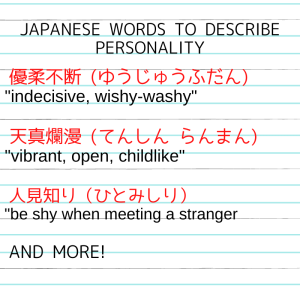In Japanese, people often put 前置き (maeoki), “introductory/opening expressions” before stating their thoughts to sound modest and polite or to hedge the risk of criticism (i.e. to cover one’s ass). This post introduces various kinds of Japanese maeoki expressions you can use to sound like Japanese!
Table of Contents
つまらないものですが
Yomi
tsumaranai mono desu ga
Meaning
This is not much, but; This is just a little something, but
Usage
It literally means “(this is) not interesting”. It is often used when one gives a gift to someone in a very humble way. It is rather a traditional phrase and not commonly used by young people, but still often heard in Japanese anime and drama.
When you bring food for someone as a gift, you can also say “お口(くち)に合(あ)うかわかりませんが”, which means “I’m not sure if this ‘suits your mouth’ (= if you like this taste), but”.
Example
つまらないものですが、これよかったらどうぞ
This is just a little something, but I’ve brought a gift for you; I hope you like it.
…たいのは山々ですが
Yomi
…tai no wa yamayama desu ga
Meaning
I wish I could do …, but; I’m very keen to do …, but
Usage
It is used when you’re very keen to do something — you have “山 (mountains)” of eagerness to do something — but you can’t, e.g. because you have a plan already.
Example
行(い)きたいのは山々ですが、その日はもう予定(よてい)があって…
I wish I could come, but I have a plan for the day already…
自慢じゃないですけど
Yomi
jiman ja nai desu kedo
Meaning
not to brag, but; This is not quite a brag, but
Usage
It is used when people do make a (small or strange) brag, so don’t take it literally…
Example
自慢じゃないけど、どれだけ食(た)べても太(ふと)らないんだよね
Not to brag, but I don’t get fat no matter how much I eat.
人のこと言えないですけど
Yomi
hito no koto ienai desu kedo
Meaning
I’m not one to talk, but
Usage
It literally means “I cannot say things about others, but”. It is used when you comment on someone’s (usually negative or peculiar) characteristics or behaviour that you also possess or do by yourself.
Example
全然人のこと言えないですけど、まゆさんって少し変ですよね。
I’m not one to talk at all, but Mayu-san is a bit weird, isn’t she?
自分で言うのもなんですけど
Yomi
jibun de iu no mo nan desu kedo
Meaning
This would not be something to say by myself, but; It would be inappropriate to say this myself, but; in all modesty
Usage
It is used when you can’t resist bragging about yourself but still want to show a bit of modesty. You can also say 自分で言うのもアレですけど.
Example
自分で言うのも{なんだけど/アレだけど}、大学生(だいがくせい)の時(とき)は結構(けっこう)モテたのよ!
This would not be something to say by myself, but I was very popular with girls/guys when I was a university student!
手前味噌ですが
Yomi
temae miso desu ga
Meaning
in all modesty; I’m afraid this may sound boastful, but
Usage
It is used when you say positive things about yourself but want to sound modest and polite. 手前 (てまえ) means “this side” and 手前味噌 means “our miso“. It is said that this phrase originates from the common practice in the past: people used to proudly talk about how good and unique their homemade miso is.
Note that this phrase is highly advanced and hence probably not understood by some Japanese people.
Example
手前味噌ですが、フォロワー数が5000人を超えました。
In all modesty, I’ve got more than 5k followers.
ふつつか者ですが
Yomi
futsutsukamono desu ga
Meaning
Although I’m (still) a clumsy and immature person
Usage
It is typically used when you accept a marriage proposal/confession of love from someone (However, it is not commonly used because many people find it sound too cute. Therefore, it is rather often heard in anime and drama). It is also used when you share a social media post on a special occasion (e.g. birthday) and show your willingness to improve yourself and stay in touch with your friends. Usually, it is followed by どうぞよろしくお願(ねが)いします.
Example
A:出会った時から、あなたの事がずっと好きでした!僕と付き合ってくれませんか?
Since I met you for the first time, I have been in love with you. Would you become my girlfriend?
B:はい、喜んで!ふつつか者ですが、どうぞよろしくお願いします!
Yes, I’m happy to! Although I’m a clumsy and immature person, I’d love to build a good relationship with you (as your girlfriend)!
今日(きょう)で30歳(さい)になりました!まだまだふつつか者ですが、皆さんどうぞよろしくお願いします!
I turned 30 today! Although I’m still a clumsy and immature person, I’d love to keep in touch with you all!
僭越ながら
Yomi
sen’etsu nagara
Meaning
I feel very honoured to do this; This would be presumptuous of me to do this, but
Meaning
It is often used when you say in a modest way that you’re in charge of something very important. It is also used when you say your opinion about something in a modest way.
Example
僭越ながら、今日は私がこの番組の司会を担当させていただきます
I feel very honoured to do this; today I’m the host of this TV show.
もしよろしければ/もしよかったら
Yomi
moshi yorosikere ba/moshi yokatta ra
Meaning
if you don’t mind; if you’re fine with this; if you please/want/wish; if it’s convenient for you
Usage
It is often used when you ask someone a favour/question; invite someone to something; or offer someone something.
Example
もしよろしければ、退会したい理由を教えていただけますか?
If you don’t mind, would you tell me why you want to unsubscribe us?
もしよかったら、来週ご飯行きませんか?
If you’re fine with this/If you feel like it, do you wanna eat out with me next week?
もしよろしければ、こちらをお使いください。
If you wish, you may use this.
この分野は素人なのですが
Yomi
kono bunya wa shirouto nano desu ga
Meaning
I’m not an expert in this field, but
Usage
It is used when researchers modestly ask a question of a presenter in an academic conference (like “This may be off the point, but…”). However, many young researchers find this phrase rather intimidating because modest veteran researchers often say this phrase and then ask astute questions.
Example
すいません、この分野は素人なのですが、なぜ提案手法がうまくいくのか、理由とその根拠をもう一度説明してもらえませんか?
Sorry, I’m not an expert in this field, but would you explain why and on what ground your proposed method works well?
お手数をおかけしますが
https://takashionary.com/glossary/otesuu-o-okake-shimasu/




Leave a Reply